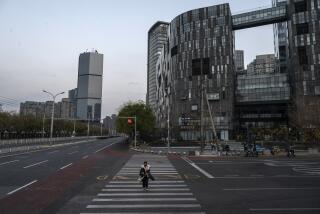Not a factory product
- Share via
Writing HAS always been a cherished dream. I was born and raised on the banks of the Yangtze River. Although I grew up in a residential compound belonging to the factory where my mother worked, I had this grand dream to become a writer ever since my teacher read my compositions. I saw myself grasping a pen to write beautiful, compelling things. Instead, in 1980 when I was just 16, I was grasping a toolbox and preparing for a lifetime job in a large state-owned military factory with 10,000 employees in Nanjing.
In the repressive routine, I felt miserable and bored to death. I was assigned to test pressure gauges. There were so many rules. Even the width of one’s trouser legs and hair lengths were subject to control -- so was one’s period. Every month female workers queued up to show blood to the “period police” to prove they weren’t pregnant. Confined within the high walls of the factory compound, I felt like a frog trapped at the bottom of a well.
I sought escape in literature, borrowing randomly from the factory’s library, which contained mostly Soviet revolutionary literature, our own “scar literature” and some Western classics. I wrote in my diary, pouring my frustrations onto the pages. I decided to teach myself English, hoping to land a job as an interpreter outside of China. I followed a radio program called “New Concept English” -- new concept indeed. I spoke English to myself; cycling in the street, I sang songs by the Carpenters. I bought novels in simplified English because they satisfied my needs to study the language and my interest in literature. I loved “Jane Eyre” and “Great Expectations,” which I found packed with inspiration.
Some colleagues laughed at me: “A toad who dreams to eat swan’s meat!” But I didn’t care what others said as the concept of individualism took root in me. Never had I imagined the effect of studying English: The walls of the well I was in were shrinking; the light of other people’s experience brightened my life. As I read more, my scribbling grew from recording daily life to writing poetry and stories.
In 1990, after a decade of slaving at the factory, I finally jumped out of the well to go to England, where I dared to study journalism. When I returned to China three years later, I eventually became a freelance journalist, writing for publications such as the Japan Times, Newsweek and the Independent. I published in domestic publications but only “safe” pieces. At Oxford, I wrote a series called “Letters From Oxford” for a Nanjing paper. However, my stories about a homosexual friend or the British Parliament system never made it into the paper -- they were deemed “too sensitive.” I have long realized that, as long as there’s censorship, I can never write for another Chinese publication.
Writing in English not only frees me politically -- both “China Remembers,” an oral history of People’s Republic of China that I coauthored with my ex-husband, and “Socialism Is Great!” will never be translated or published in mainland China -- but it also frees me from any inhibition I might have if I were writing in Chinese. For example, the sex scene in my memoir might have been less detailed. I am not sure if Chinese is the best language for expressing emotions, but I do borrow vivid idioms and sayings from Chinese to give my writing some cultural flavor.
Do I dream in English or Chinese? Many have asked me this question. That I don’t know. But I still dream a great deal.
More to Read
Sign up for our Book Club newsletter
Get the latest news, events and more from the Los Angeles Times Book Club, and help us get L.A. reading and talking.
You may occasionally receive promotional content from the Los Angeles Times.








